
Kesmas-National Public Health Journal
Scope & Guideline
Advancing Public Health Knowledge for All
Introduction
Aims and Scopes
- Public Health Research and Evaluation:
The journal focuses on empirical research that evaluates health programs, policies, and practices, particularly in Indonesia. This includes assessing the effectiveness of public health interventions, understanding community health needs, and identifying gaps in health services. - Environmental Health:
A significant portion of the journal's publications addresses the intersection of environmental factors and health outcomes, exploring issues such as pollution, sanitation, and the health impacts of climate change. - Epidemiological Studies:
The journal publishes studies that investigate the epidemiology of various diseases, including infectious diseases like COVID-19 and chronic conditions. These studies often utilize robust statistical methods to analyze health trends and risk factors. - Health Behavior and Education:
Research on health behaviors, education, and promotion is a core focus, examining factors that influence public health practices, such as vaccination, nutrition, and hygiene, particularly in vulnerable populations. - Qualitative and Mixed Methods Research:
The journal encourages qualitative and mixed-methods approaches to gain deeper insights into health behaviors, community perceptions, and the social determinants of health.
Trending and Emerging
- COVID-19 Research:
The journal has increasingly focused on studies related to COVID-19, including epidemiological assessments, psychological impacts, vaccine acceptance, and the effectiveness of public health interventions during the pandemic. - Mental Health Awareness:
There is a growing trend in publishing research on mental health, particularly in the context of pandemic-related stress, anxiety, and coping strategies. This reflects a broader recognition of the importance of mental health in public health discourse. - Nutrition and Public Health:
Emerging themes related to nutrition, particularly in the context of stunting and dietary impacts on health outcomes, have gained traction. These studies often address the interplay between nutrition, public health policies, and community health. - Health Technology and Digital Health:
Research on the integration of technology in health services, including telemedicine and digital health tools for patient management, has seen an uptick. This trend reflects the adaptation of health services to contemporary challenges and technological advancements. - Environmental Health Risks:
The journal has increasingly published studies focusing on environmental health risks, particularly those related to air quality, pollution, and their health impacts, highlighting the importance of environmental factors in public health.
Declining or Waning
- Traditional Health Practices:
Research related to traditional and alternative health practices has seen a decrease. This may reflect a growing emphasis on evidence-based medicine and a shift towards modern health interventions. - Non-communicable Diseases (NCDs):
Although still relevant, the frequency of publications specifically addressing NCDs has waned in favor of more urgent topics such as infectious diseases and public health responses to pandemics, particularly during and post-COVID-19. - Health Systems Management:
There has been a noticeable decline in studies focusing solely on health systems management and administrative aspects, as the journal's focus has shifted towards immediate public health challenges and responses.
Similar Journals

Global Health Research and Policy
Advancing global health through impactful research.Global Health Research and Policy, published by BMC, is a leading open-access journal dedicated to advancing the field of global health through impactful research and policy analysis. Since its establishment in 2016, the journal has garnered a prestigious reputation, achieving a Q1 ranking across several categories including Epidemiology, Health Policy, Health (social science), and Public Health, Environmental and Occupational Health in 2023. With an E-ISSN of 2397-0642, this UK-based journal ensures the dissemination of high-quality research to a global audience, promoting accessibility and collaboration. The open-access model facilitates the sharing of knowledge and innovation essential for addressing pressing health challenges worldwide. Researchers, professionals, and students alike will find valuable insights and relevant policy discussions in each issue, making Global Health Research and Policy a vital resource for those committed to improving health outcomes on a global scale.
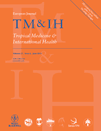
TROPICAL MEDICINE & INTERNATIONAL HEALTH
Transforming research into impactful health solutions.Tropical Medicine & International Health is a distinguished journal published by Wiley, dedicated to the exploration and dissemination of cutting-edge research in the fields of infectious diseases, parasitology, and public health. With a robust open-access option, the journal facilitates the widespread sharing of information critical to addressing health issues in tropical and international settings. Since its inception in 1996, it has established a significant presence in the academic community, as indicated by its impressive ranking in various Scopus categories, notably positioned in the Q1 quartile for Parasitology and Q2 for both Infectious Diseases and Public Health, reflecting its high influence within these domains. The journal's commitment to advancing knowledge on health challenges prevalent in tropical environments makes it an invaluable resource for researchers, healthcare professionals, and students alike who are dedicated to improving global health outcomes.
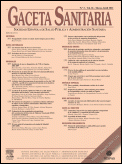
Gaceta Sanitaria
Innovating solutions in public, environmental, and occupational health.Gaceta Sanitaria is a leading open-access journal published by ELSEVIER focusing on the vital fields of public health, environmental health, and occupational health. Since its inception in 1987, the journal has been dedicated to disseminating high-quality research and insights that contribute significantly to the advancement of public health knowledge and practices. With an impressive Scopus rank of #243 out of 665 in its category and a 63rd percentile ranking, Gaceta Sanitaria maintains a strong impact within its discipline, reflected in its Category Quartile of Q3. The journal warmly welcomes submissions from researchers, professionals, and students alike, encouraging a diverse exchange of ideas and innovations that can shape future public health strategies. Operating under an open-access model, Gaceta Sanitaria ensures that research is readily available to the global community, further enhancing its commitment to public education and health promotion. Located in beautiful Spain, the journal serves as a pivotal platform for those invested in the ongoing dialogue and research in health-related fields.

Current Epidemiology Reports
Advancing Public Health KnowledgeCurrent Epidemiology Reports, published by Springer Heidelberg, stands as an essential journal in the field of public health and epidemiology. With its ISSN and E-ISSN of 2196-2995, the journal serves as a dynamic platform for disseminating pioneering research and insightful reviews addressing crucial epidemiological trends and challenges. The journal emphasizes open access to enhance the visibility of groundbreaking studies among a global audience, thereby facilitating collaboration and innovation within the scientific community. Although specific metrics such as the impact factor are currently unreported, its commitment to rigorous peer review ensures that only high-quality research is shared. Defined by its aim to report on infectious diseases, chronic health conditions, and emerging epidemiological phenomena, Current Epidemiology Reports is a vital resource for researchers, healthcare professionals, and students eager to stay abreast of advances in this ever-evolving discipline and contribute to the promotion of public health worldwide.
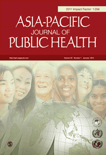
Asia-Pacific Journal of Public Health
Innovating solutions for diverse populations' health needs.Asia-Pacific Journal of Public Health, published by SAGE Publications Inc, is a leading platform for disseminating scholarly research in the field of public health. With an impressive scope that spans from the late 1980s to the present, the journal offers a wealth of articles that address critical issues faced by diverse populations in the Asia-Pacific region. Categorized in the Q3 quartile for both Medicine (miscellaneous) and Public Health, Environmental and Occupational Health, it holds a significant position within its field, ranked 310 out of 665 in the Scopus database. Researchers and professionals have access to valuable insights that inform public health policy and practice, making this journal an essential resource for those aiming to enhance health outcomes in the region. While not currently open access, the journal's rigorous peer-review process ensures the integrity and relevance of its content. As the landscape of public health continues to evolve, the Asia-Pacific Journal of Public Health remains a vital resource for advancing knowledge, fostering collaboration, and promoting a healthier society.

ANNALI DELL ISTITUTO SUPERIORE DI SANITA
Unlocking vital health insights for the global community.ANNALI DELL ISTITUTO SUPERIORE DI SANITA is a prestigious open-access journal established in 1965, published by the Istituto Superiore di Sanità in Italy. With an ISSN of 0021-2571 and an E-ISSN of 2384-8553, the journal provides a vital platform for disseminating high-quality research in the fields of medicine and public health. Recognized for its significant contributions, it holds a Q2 ranking in both Medicine (miscellaneous) and Public Health, Environmental and Occupational Health as of 2023, placing it in the 60th percentile in Scopus rankings. The journal is committed to advancing knowledge and practice through rigorous peer-reviewed articles, making it an essential resource for researchers, healthcare professionals, and students interested in contemporary health issues. Its commitment to open access since 2001 ensures that research findings are readily available, fostering collaboration and innovation in the global health community.
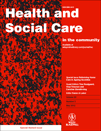
HEALTH & SOCIAL CARE IN THE COMMUNITY
Empowering communities through innovative health and social care research.HEALTH & SOCIAL CARE IN THE COMMUNITY, published by WILEY-HINDAWI, is a prominent journal in the fields of health policy, public health, social sciences, and social work, reflecting its broad academic appeal and comprehensive scope. With an impressive categorization in Q1 for Sociology and Political Science and Q2 rankings across various health-related fields, the journal serves as a vital resource for researchers, practitioners, and students dedicated to advancing knowledge in health and social care domains. Since its inception in 1993, it has consistently promoted high-quality, peer-reviewed articles that tackle contemporary issues, ensuring its relevance and impact in our rapidly evolving society. While the journal is accessible through subscription, it stands out for its commitment to disseminating crucial research findings which are pivotal to establishing effective practices and policies in health and social care. As it approaches its convergence into 2024, the journal continues to be a key player in supporting interdisciplinary dialogue and fostering research that influences real-world change.

Iranian Journal of Public Health
Advancing public health research for a healthier tomorrow.Iranian Journal of Public Health is a premier publication dedicated to advancing the field of public health research. Established in 2001 and published by the Iranian Scientific Society Medical Entomology, this Open Access journal provides an invaluable platform for disseminating innovative findings and practices aimed at addressing public health challenges both locally and globally. With its roots tracing back to 1973, the journal has evolved through multiple converged years, reflecting a rich history of commitment to the health sciences. Currently categorized in Q3 within Public Health, Environmental, and Occupational Health, as per the 2023 rankings, it ranks 406 out of 665 in the Scopus database, placing it in the 39th percentile. This significant positioning underscores its role in fostering high-quality research that informs policy and enhances community health outcomes. The editorial team is dedicated to upholding rigorous academic standards while embracing diverse perspectives that resonate within the dynamic landscape of public health. It is an essential resource for researchers, professionals, and students alike, fostering collaborative efforts in the relentless pursuit of health equity and sustainability.

Journal of Migration and Health
Exploring the Vital Link Between Migration and HealthJournal of Migration and Health, published by ELSEVIER, is a leading open access journal dedicated to exploring the intersection of migration and health, a critical area of study in contemporary social sciences. Since its inception in 2020, this journal has quickly established itself in the academic community, earning a prestigious Q1 ranking in several categories including Demography, Health (Social Science), Infectious Diseases, and Sociology and Political Science for 2023. With an impactful presence reflected in its Scopus Rankings—such as Rank #15 in Demography and Rank #57 in Health (social science)—the journal serves as a vital platform for researchers, practitioners, and students interested in understanding the complex health dynamics affecting migrant populations. The journal promotes scholarly discourse through rigorous peer-reviewed articles, fostering knowledge that informs health policies and practices relevant to migrants across the globe. For those keen on delving into pressing health issues influenced by migration trends, the Journal of Migration and Health offers rich insights and research opportunities, playing an essential role in shaping the future of health studies in a global context.
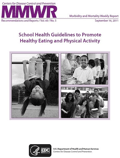
MMWR-MORBIDITY AND MORTALITY WEEKLY REPORT
Transforming Health Insights into ActionMMWR-Morbidity and Mortality Weekly Report, published by the Centers for Disease Control and Prevention (CDC), stands as a preeminent journal in the fields of epidemiology, health information management, and public health. With an impressive reputation bolstered by an H-index reflecting its influence, MMWR is recognized as a Q1 journal as of 2023 across multiple health-related categories. Given its ranking in the 99th percentile among its peers, it provides critical insights and reports that shape health policy and practice globally. The journal is accessed freely by the research community, ensuring that key findings related to morbidity and mortality are widely disseminated and utilized. Established in 1981 and continuing through to 2024, MMWR remains an essential resource for researchers, health professionals, and students dedicated to understanding and combating health issues in the United States and beyond. Its ongoing contributions to the public health dialogue illustrate the journal's pivotal role in promoting health awareness and safety.